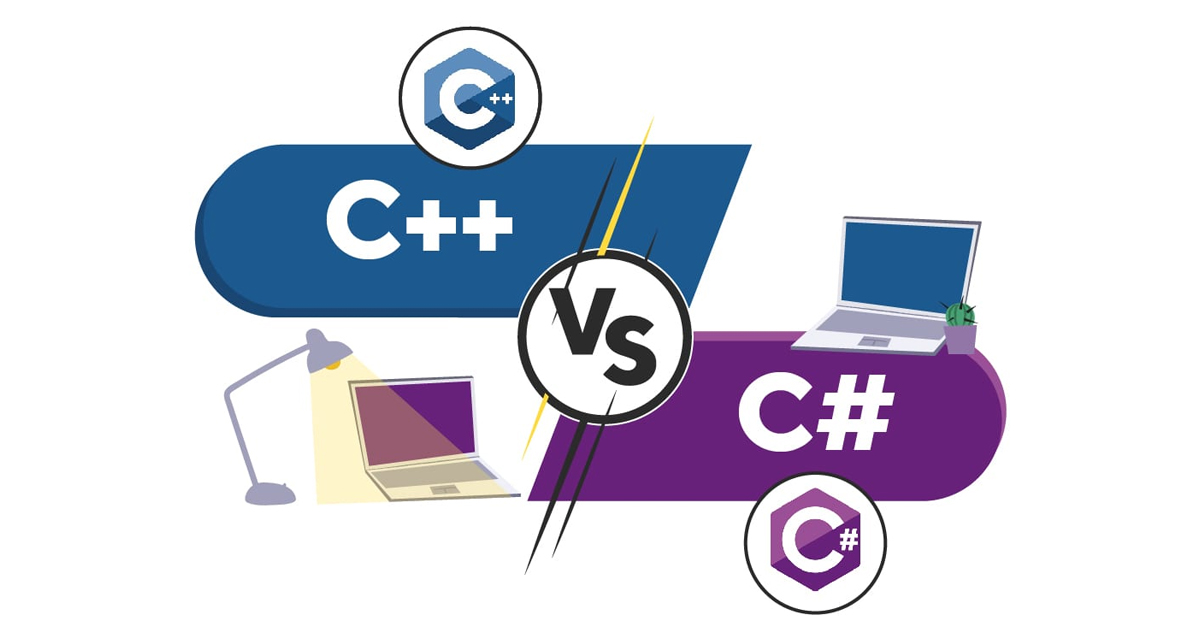
Trending online courses in business, tech, and education
With more world-class content launching every week, there are always new topics to explore

C++ is the foundation from which the others derive. Therefore, this article focuses on the similarities and differences between C# vs. C++.
C++ overview
C++ was invented in 1979 by Bjarne Stroustrup. It is based on the original C language and was initially called “C with Classes.” The name was changed to C++ to indicate an increment beyond the original. This is opposed to D, a programming language released in 2001.
C++ has undergone many changes since its inception. A formal ANSI standard was published in 1999 with a significant revision in 2011. Minor revisions were also made in 2014 and 2017. Bottom line: C++ is very much alive.
Person in front of desktop and laptop coding
C++ is described as a high-performance, multi-paradigm language. It supports object-oriented language and procedural, generic, and functional programming styles. In any given web application or operating system, you could find all three styles in use.
Probably the most important feature of C++ is that it compiles into native machine code. Most programming today is done through interpretive languages such as JavaScript, Java, and C#. It provides a much faster execution potential when it’s run directly on the CPU without any supervision or translation. In the end, the developer controls everything about resource management in a C++ program.
Some people refer to Java as the kinder, gentler C++, but I disagree. Java is an extended subset of the language with a very different programming philosophy. On the other hand, I see C# as a closer fit to the description. Java architects who have referred to C# as a cheap knock-off of their platform are wrong!
The design of C# is much more aligned with C++. Through the incremental naming process, C# plays on the musical sharp note. In other words, it’s a halftone higher. Furthermore, there are a number of C++ features intentionally omitted from Java that are fully supported in C#.
C# was originally developed by Microsoft toward the end of the 20th century. It was standardized by the European Computer Manufacturer’s Association (ECMA) and ISO but was originally established as a closed source language connected to Microsoft’s .Net framework and Visual Studio. Today, C# is open source and platform-neutral. Version 10.0 was released in 2021 along with .Net 6.
Since C# was designed to be similar in both syntax and style to C++, both languages are statically linked. Unlike other scripting languages, the variables, parameters, and return types must be compatible through compile and run times. In addition, both C languages support references, pointers, and values. However, it’s rare in both C# and C++ to explicitly code pointer syntax.
Both languages treat method exception declarations the same and generate new first-class types from templates. For C#, this is based on generics.
Another similarity is the support of the struct and class keywords. In C++, most developers use the struct to define simple data objects while a class defines initial values for values and states of behavior. In C#, the struct has functional limitations and is treated as a value type. Thus, it formalizes traditional C++ usage.
Both languages also support compiler-deduced variable types. C++ uses the keyword auto, while C# uses var.
A critical similarity with C# vs. C++ is in their support for functional programming. C++ inherited its function pointers from C. Meanwhile, C# always had delegates, which are the equivalent of function pointers.
Both languages support functions as data and lay the groundwork for more sophisticated functional programming. Current versions of C++ and C# both support lambda expressions as an inline syntax for defining anonymous functions.
Inheritance, polymorphism, and interfaces are supported in both. Although, the mechanisms under the hood are different.
Three significant differences jump out immediately between the two languages.
C# uses a garbage collector to release dynamically allocated memory automatically. In C++, the developer must explicitly delete any memory allocations.
Through a technique known as Resource Allocation Is Initialization (RAII) and smart pointer templates, much of the tedium of resource management is automated. This gives the C++ program the advantage of immediate and efficient memory management without the need to explicitly free memory in the source code.